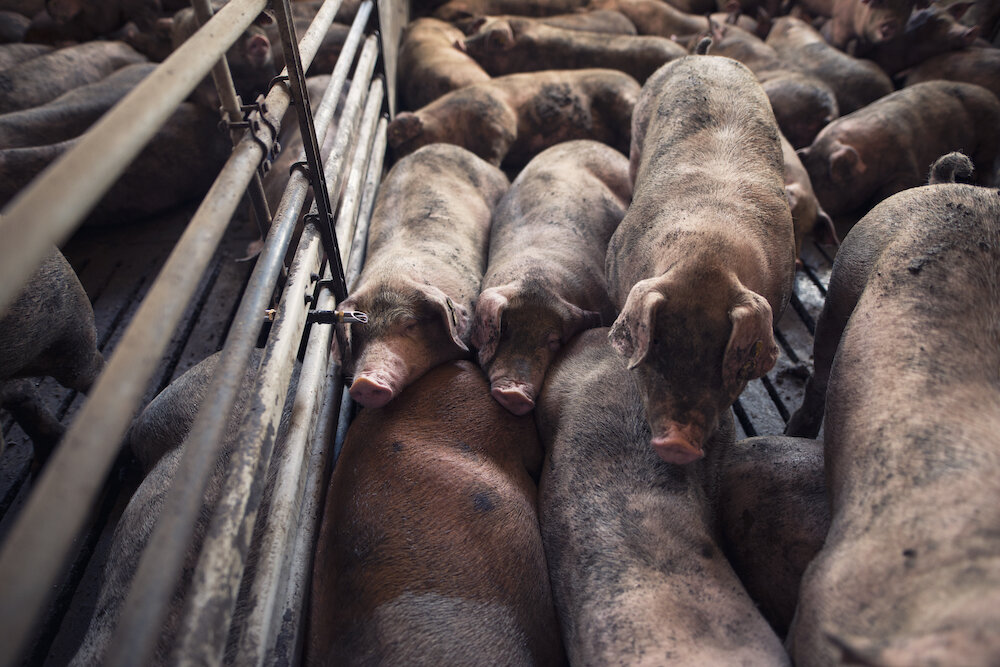Biogas project is a false solution to serious harm done by CAFOs
Communities don’t support directed biogas, and a provision of the Civil Rights Act should protect them. So why are these projects touted as a panacea for communities and the environment?
The predominantly Black, brown and low-wealth communities living near eastern North Carolina’s hog concentrated animal feeding operations (CAFOs) have long suffered from the debilitating environmental impacts of the noxious fumes spewing from the farms. When Align Renewable Energy — the new joint business venture of Dominion Energy and Smithfield Foods — announced they had secured permits and were moving forward with their plans to install anaerobic digesters that would capture methane from hog waste lagoons at 19 facilities as part of the Grady Road Project, which would ultimately be converted into natural gas, it was presented as a solution to improve daily life in the impacted communities. Wouldn’t the project — which Smithfield eventually plans to bring to 90 percent of their company-owned hog finishing operations — create more breathable air and cleaner drinking water for folks living near the farms in Duplin and Sampson counties?
Unfortunately, the Grady Road Project offers neither short- nor long-term relief — only more dangerous air and water pollution impacting the health and quality of life for people living in the area.
Converting hog waste to natural gas brings a slew of additional environmental concerns and fails to address the root cause of the pollution issues — harmful waste management practices. First, there are the pipelines. The project will require 19 miles of pipeline to be constructed to get the captured methane from individual farms to a central processing facility, which creates the possibility of methane leakage, pipeline rupture, and the exercising of eminent domain to take private land. And, since the waste lagoons will be covered to trap the methane, ammonia released to the atmosphere will decrease and result in greater nitrogen concentrations in the liquid waste — up to three and half times more — leaving the area prone to even more devastating impacts from a waste lagoon breach during a hurricane. Finally, the Grady Road Project aims to keep some existing lagoons to be used for secondary treatment. The bottom line: the project fails to meaningfully address the environmental impact of CAFOs.
North Carolina’s Department of Environmental Quality (DEQ) is not only responsible for protecting the environment and health of those living in the state but also required to do so, according to Title VI of the Civil Rights Act of 1964. DEQ receives funding from the EPA and, as such, must comply with Title VI when issuing permits for projects and ensure that “no person on the ground of race, color, or national origin, be excluded from participation in, be denied the benefits of, or be subjected to discrimination.” This includes the permits for anaerobic digesters at hog CAFOs, but so far DEQ has not upheld their constitutional obligation.
The public input process is exclusionary of low-wealth and BIPOC communities, as well as environmental groups or individuals who oppose the permits. People disproportionately impacted by the biogas project have limited opportunities to give public input into the process where the outcome of permit issuance often seems like a foregone conclusion, despite former DEQ Secretary (current EPA Administrator) Michael Regan’s assertion in an August 2020 statement that, “an air permit should not be the first time that a community becomes aware of a proposed facility.”
“We must strengthen our state laws and regulations to be more inclusive of communities of color and tribal concerns before a location is chosen and well before a permit application is submitted,” Regan wrote.
Unfortunately, a provision in the recently passed Farm Act of 2021 could make it even more difficult for DEQ to address those concerns and hold companies like Dominion and Smithfield accountable for environmental harm. Under the Farm Act, future anaerobic digesters will be covered by a general permit, which would speed up the permit processing time and further hinder the community’s ability to provide public comment. General permits are intended for projects that have little environmental impact. Since air pollution from Duplin County hog farms is directly responsible for 89 deaths in the county each year, one could hardly argue that the biogas project and anaerobic digesters have little environmental impact.
North Carolina should be investing in better waste management that addresses environmental and community health impacts of the current lagoon and sprayfield waste management system utilized by hog CAFOs and using more environmentally sound approaches. Instead, the companies who profit from harming the environment stand to make even more money from ventures like the Grady Road-directed biogas project and the expansion of anaerobic digesters across eastern North Carolina. Worse yet, without a clear process established for DEQ to assess the cumulative impacts on communities from projects their department permits, it seems nearly impossible to make anyone answer for the egregious and unconstitutional disregard of people’s health and well-being.
It’s time to clarify and codify DEQ’s authority and constitutional obligation to protect communities harmed by environmental injustice.
As incoming DEQ Secretary Elizabeth Biser said of DEQ’s role in issuing permits during her confirmation hearing, “No matter where you live in the state, income, race, everyone has a fair chance to interact with the department.”
Let’s hope those words aren’t just hot air.
Sources:

